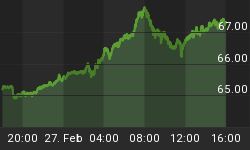It's very seldom that I agree with Bernanke on anything. He is wrong about the savings glut, about the cause of income inequality, about deflation, and countless other things.
Bernanke never admitted the Fed's role in creating the housing bubble, and he does not see the new bubbles that have formed.
Yet today, Bernanke stated many things in a cohesive manner that I happen to agree with.
China Takes Marbles
Please consider US Congress Pushed China into Launching AIIB, says Bernanke.
Beijing was pushed into launching the Asian Infrastructure Investment Bank by US lawmakers' refusal to give China greater clout in existing multilateral institutions, Ben Bernanke has said.
"The US Congress is largely at fault for all that's happening," the former chairman of the Federal Reserve said in Hong Kong on Tuesday.
America's legislature blocked a 2010 International Monetary Fund agreement to shift 6 per cent of quota -- and voting rights -- to emerging economies, which Mr Bernanke believes would have "better reflected the increasing role of China" and other nations.
"The US Congress has not approved it. They should, they haven't," Mr Bernanke said. "So I understand why other countries say, 'well let's take our marbles and go home '."
The AIIB, which will be capitalised at $100bn, now has 57 members including most big European economies.
However, the former Fed chairman played down the practical implications of the AIIB, saying the bank was largely symbolic.
Mr Bernanke also said too much attention was being focused on the internationalization of the renminbi, which was as much a matter of "national prestige" as of practical economic value. In reality, he said, the Chinese currency's share of global reserves was "very tiny" and even its share of trade settlement was "modest".
China should continue gradual steps to open up its capital account, to deepen its bond markets and to allow a bigger role for the private sector, Mr Bernanke advised.
These were all preconditions to make the renminbi a reserve currency, he said, but they were more important as a means of improving capital allocation. The ultimate goal, he said, was to shift China's economic model from one dominated by heavy industry and investment to one in which the consumer and the service industry played a much bigger role.
Agreements
- US pushed China into launching AIIB
- Bank largely symbolic [so it doesn't much matter anyway]
- Too much attention on renminbi
- China needs to open up capital accounts and bond markets as precondition to becoming [major] reserve currency
- China needs to shift from heavy industry and investment to service [rebalance]
- Internationalization of the renminbi is a matter of "national prestige"
That's a lot of agreements!
Point six is precisely applicable to China making the case for including the yuan in the IMF's SDR reserve currency basket.
Battle Over Symbolism
In reference to AIIB, former US Treasury secretary, Larry Summers Wrote "this may be remembered as the moment the United States lost its role as the underwriter of the global economic system. "
I think it's a battle over symbolism.
The US pressured the UK, Australia, and numerous other countries to not join, but 57 countries did anyway.
Wikipedia provides this Description of AIIB
The Asian Infrastructure Investment Bank (AIIB) is an international financial institution proposed by the government of China. The purpose of the multilateral development bank is to provide finance to infrastructure projects in the Asia region.
As of April 15, 2015, almost all Asian countries and most major countries outside Asia had joined the AIIB, except the US, Japan (which dominated the ADB) and Canada. North Korea's and Taiwan's applications for Prospective Founding Member (PFM) were rejected.
U.S. pressure allegedly tried to keep Australia and South Korea from signing up as founding members, despite the fact that they expressed an interest in it. However, both Australia and South Korea have officially applied to join the bank in late March 2015, ignoring objections by the United States.
In early March 2015, the United Kingdom's Chancellor of the Exchequer, George Osborne, announced that Britain had decided to apply to join the Chinese-led Asian Infrastructure Investment Bank, becoming the first major Western country to do so. The announcement was criticised by the Obama Administration in the United States. A US government official told the Financial Times, "We are wary about a trend toward constant accommodation of China, which is not the best way to engage a rising powe r."
Obama Goes After UK, Australia, World
I wrote about the AIIB on March 16, in Obama Goes After UK, Australia, the World for "Constant China Accommodation"; US Influence Clearly Waning.
US Pressure, Self-Serving Statement
In a self-serving if not downright idiotic statement, a US official claimed "Large economies can have more influence by staying on the outside and trying to shape the standards it adopts than by getting on the inside at a time when they can have no confidence that China will not retain veto powers ."
I do not believe it's possible to ever have more influence on the outside than in. And certainly had the US, UK, other European nations, and Australia all gotten together on the inside, the position of the US is downright idiotic.
"We are wary about a trend toward constant accommodation of China, which is not the best way to engage a rising power ."
What about constant accommodation of a waning power?
The bank itself may not matter much, but the fact major nations are willing to tell Obama to go to hell does.















